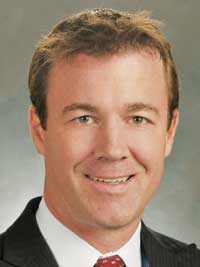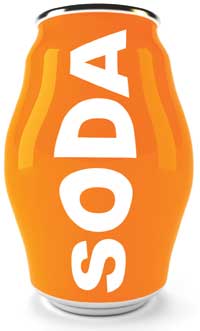Growing Concern
Originally Published <a data-cke-saved-href="/sites/beta.nutritionaloutlook.com/files/articlelist.php?issueid=62" href="/sites/beta.nutritionaloutlook.com/files/articlelist.php?issueid=62" "="">NO July/August 2010
Originally Published NO July/August 2010

America is getting fatter. We are reminded of this with each new study that is released, such as the recent "F as in Fat" report issued by Trust for America's Health.
The President and First Lady have both taken on the fight against obesity, forming the White House's Task Force on Childhood Obesity and the First Lady's Let's Move campaign. The Food and Drug Administration and the Federal Trade Commission have also identified the obesity issue as a top priority.
Concern over America's overweight population and the long-term health effects of obesity has forced many companies in the food and beverage industries to revisit marketing and sales strategies and develop plans for dealing with increased attention from regulators and other governmental agencies to this issue.
One industry in particular has been proactive in addressing the obesity dilemma. Responding to the gauntlet thrown down by the First Lady and other regulators, the beverage industry, spearheaded by the American Beverage Association (ABA) and leading companies in the industry, has instigated several industry initiatives to combat obesity.
Beverage Criticism
The beverage industry has certainly received its share of criticism for contributing to the growing trend of obesity in the United States. Proponents of "fat tax" legislation, designed to make the purchase of high-calorie drinks cost prohibitive, rail against the manufacturers of soft drinks and other sugar-laden beverages for their allegedly wanton disregard for the health of consumers. (The proposed legislation, of course, is another example of legislators ignoring the failure of people to actually demonstrate self-control, instead determining that legislation is necessary to coerce people into making good health decisions.)

ABA, the primary trade association representing companies that manufacture and distribute non-alcoholic beverages in the United States, has repeatedly argued that the criticism the beverage industry has received is unjust.
According to figures cited by ABA in a June 17 press release, soda, along with sweetened waters, sports drinks, and energy drinks, contribute only 5.5% of the calories in the American diet.
"Singling out one item as the cause of obesity completely misses the mark," said Susan Neely, ABA president and CEO, in the press release. "If we really want to solve this national public health challenge, we must focus on educating Americans through comprehensive approaches that include nutrition education based in fact and focusing on total diet and exercise-not efforts that are simplistic and [that] will be ineffective."
Two programs implemented by ABA and beverage industry leaders, namely the School Beverage Guidelines program and the Clear on Calories initiative, are examples of such approaches being undertaken by the beverage industry.
School Beverage Guidelines
The Alliance School Beverage Guidelines final progress report was issued in March of this year. This report is the final annual report summarizing the impact and status of the School Beverage Guidelines (the Guidelines).
The Guidelines were established more than four years ago in a joint effort between the Alliance for a Healthier Generation, ABA, The Coca-Cola Co., Dr. Pepper Snapple Group, and PepsiCo. In May 2006, these various entities worked together to develop the Guidelines, which limit the number of calories available in beverages by providing students with more low-calorie, smaller-portion choices. Implementation of these standards began in 2006, with a goal for complete integration by the 2009–2010 school year.
Essentially, ABA and the three major beverage industry leaders encouraged their bottlers to work with schools to amend existing contracts and change the product mix available to schools to include only beverages outlined in the Guidelines.
The Guidelines reflect a substantial change in the types and sizes of beverages provided to schools. Full-calorie sodas have been virtually eliminated, with only bottled water, milk, and 100% juice in 8-oz portions allowed at the elementary and middle school levels. High schools have a few more options: some no- or low-calorie beverages, as well as sports drinks, but serving sizes are still limited to 8 oz in most cases, with a few 12-oz exceptions.
This major shift in drinking options provided to school children resulted in an 88% decrease in total beverage calories shipped to schools in the five-year period (from the 2004–2005 school year to the 2009–2010 school year). As a result of the Guidelines, full-calorie soft drinks have been virtually eliminated from schools, with a 95% reduction in shipments of full-calorie soft drinks.
Clear on Calories
While the School Beverage Guidelines have been an ongoing process over the last four years, the Clear on Calories initiative was introduced earlier this year in response to the First Lady's call for innovative, industry-led initiatives to furnish more information to consumers.
The Clear on Calories initiative calls on industry companies to display calories more prominently in three areas: product labels, vending machines, and fountain equipment.
Once the initiative is fully implemented, total calorie counts will be displayed on the front labels of all beverage containers, up to and including 20-oz products, with a 12-oz serving size used for multiserve beverage packages.
Companies will also display total calorie counts for the entire container on the beverage-selection buttons of vending machines controlled by the companies. Finally, calorie counts will be shown prominently on all fountain beverage machines controlled by industry companies. Implementation of the Clear on Calories initiative was scheduled to begin this year and be completed in 2012.
Moving Forward
Some have been skeptical of the beverage companies' motives for making the changes described above, labeling such moves as nothing more than public-relations campaigns to win over a public that is looking to slim down. Programs such as these are undertaken with careful consideration and are usually made after balancing numerous factors, including both short-term and long-term goals.
It is clear that the programs were not developed to boost sales in the short-term, as the 95% decrease in full-calorie shipments was not financially beneficial to beverage companies. Thus, building public goodwill was almost certainly a factor in making moves such as these.
However, regardless of whether the motives were completely altruistic or not, the results of the initiatives cannot be ignored. The School Beverage Guidelines provide healthier beverage alternatives for our children, and the desired end-result of the Clear on Calories initiative, to provide more information to the public so that people can make their own informed drink choices, is encouraging.
With the Clear on Calories initiative still in its infancy stages, and the School Beverage Guidelines shifting to voluntary compliance, the long-term success of these programs will give the consuming public clarity as to whether the beverage industry is really interested in assisting people to make healthy changes to their diets, or whether it is just trying to generate positive publicity.
Justin J. Prochnow is an Of Counsel lawyer in the Denver office of the international law firm of Greenberg Traurig LLP. His practice concentrates on legal issues affecting the food and beverage, dietary supplement, and cosmetic industries. He can be reached at 303/572-6562 or at prochnowjj@gtlaw.com.
The impact of GLP-1 on supplements, functional foods, and retail: a webinar from CRN
January 29th 2025The recent CRN webinar discussed GLP-1 medications' impact on supplements, functional foods, and retail, covering consumer trends, global market insights, retailer strategies, industry implications, and future opportunities for innovation.





